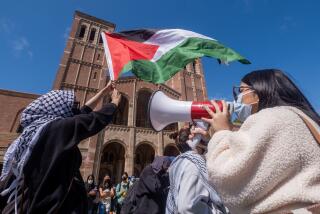Arabs Get Back at Barak Without Lifting a Finger
- Share via
UMM AL FAHM, Israel — As far as Israel’s Arab voters were concerned, Tuesday was payback time for all the wrongs they thought that Prime Minister Ehud Barak had committed against them during his short time in office.
Even the specter of right-wing leader Ariel Sharon coming to power didn’t keep them from helping to ensure that Barak’s defeat was massive and humiliating. Eight hours after the polls opened in Israel’s second-largest Arab town, so few people had come to vote that election workers were having trouble staying awake.
“There has never been an election like this,” said Jamil Ighbarieh. By 3 p.m., only seven of the 738 registered voters at his polling station had cast ballots. All around town, the turnout was about the same--just 1%-2% halfway through the day. This morning, Israel Television said the Arab turnout was 18%--a shocking decline from the 1999 election that brought Barak to power.
Ighbarieh, the polling committee secretary, was certain that he knew why.
“This is a slap in the face to Ehud Barak,” he said. “This will probably be the only time there will be a boycott of the elections. Today, we are expressing our disappointment with Barak for failing to make peace, our solidarity with the 13 [Israeli] Arabs who were killed by the Israeli police and our anger at the way he has treated Arabs.”
Members of the families of slain Israeli Arab demonstrators took part in a convoy Tuesday, visiting villages and towns in the Wadi Ara valley of the Lower Galilee and urging voters to shun the polls. It was here that much of the rioting took place in the first week of October, and here where several demonstrators were shot dead.
Even before the voting ended, some Israeli observers were fretting that the low turnout would hurt the Israeli Arab struggle to achieve equal rights in the Jewish state.
If Sharon forms a right-wing government, it will probably seize on the low turnout as proof that Israeli Arabs are not responsible citizens, said Mohammed Daroushe, spokesman for Givat Haviva, an institution that promotes Arab-Jewish coexistence within Israel.
“They will make things more difficult for the Arabs,” Daroushe said. “They may decide to pass laws that would force Arabs to serve in the army and pledge loyalty to the state.” Israeli Arabs are exempt from mandatory army service.
“If they pass such laws, Arabs will mount protests, and this may lead to more confrontations,” Daroushe said. “A right-wing government may also say that this shows that Arabs should be excluded from referendums on important issues like withdrawing from the Golan Heights or the West Bank.”
Daroushe said his hope is that the Israeli left will interpret the boycott as a wake-up call and realize that it must work harder to meet the needs of Arab communities. Israel’s Arab towns and villages suffer the highest rates of poverty and unemployment in the nation.
In May 1999, Israel’s 500,000 Arab voters played a decisive role in Barak’s landslide victory over then-Prime Minister Benjamin Netanyahu. About 76% of eligible Israeli Arab voters went to the polls, and more than 97% cast their ballots for Barak.
On Tuesday, it seemed certain that the turnout would be the lowest in Israeli history for Arab voters. Sharon’s victory was so decisive that Arabs, who make up about 12% of the electorate, could not have secured Barak’s victory even if they had turned out to vote for him. But their rejection could make it harder for Barak to remain politically viable. On Tuesday, after conceding the election, he said he will step down as Labor Party leader and give up his seat in parliament.
In Umm al Fahm, a stronghold of the fundamentalist Islamic Movement, Arabs said that they heeded the call of all the Arab political parties and of the families of the slain demonstrators to stay away from the polls. In October, rioters here blocked the Wadi Ara Road, a vital east-west artery in the Lower Galilee that cuts across Israel. Police used rubber bullets and live ammunition against the demonstrators.
On the eve of the election, Barak apologized for the deaths of the 13 Arabs, but Arab voters dismissed his gesture as too little too late.
“Usually, by now, at least 250 people would have voted,” said Nadir Mahameed, a 44-year-old vice principal who was in charge of another polling station in Umm al Fahm, where the turnout was dismal. “We have 711 voters registered here, and 11 have come so far,” he said. Mahameed, who voted for Barak last time, said he planned not to vote this time.
“There is a consensus,” he said. “From Day 1, Barak ignored all the Arab parties in the Knesset [Israel’s parliament]. From Day 1, he ignored the needs of the Arabs.”
A Sharon victory might actually be good for the Arabs, Mahameed said. “Not because we like him,” he said, “but because if he does the things Barak did to the Palestinians, the world’s reaction will be much stronger than it has been toward Barak.”
Ibrahim Mahameed, 21, walked into his polling station, cast his ballot and said he disagreed with those who chose to stay away.
“I’m voting for Barak,” said Mahameed, a distant relative of Nadir Mahameed. “I voted for Barak last time. These Arab parties told us to vote for them in the last elections, and we voted. Now they tell us not to vote? It is not right. I don’t expect much from Barak, but I am voting to prove that I am a citizen and that I have a right to vote.”
More to Read
Sign up for Essential California
The most important California stories and recommendations in your inbox every morning.
You may occasionally receive promotional content from the Los Angeles Times.













